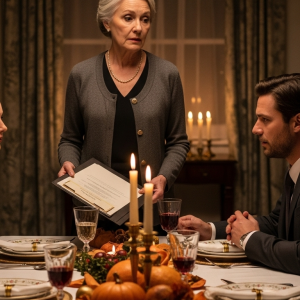My granddaughter Emma dropped her voice to a whisper and shattered my world. “Grandma, I heard Mommy and Daddy say they’re putting you in a home today and taking your money.”
I smiled and patted her eight-year-old head, while a rage I hadn’t felt in years built in my chest like a wildfire. My son Brian and his wife Jessica had no idea what they’d just awakened.
Let me back up. Eighteen months ago, my husband Frank passed away suddenly. Before the casseroles were even cold, Brian and Jessica swooped in, all concern and fake tears. “Mom, you can’t live alone anymore,” Brian insisted. “Come stay with us. We’ll take care of you.”
What they really meant was: “Come be our live-in nanny and ATM.” Grief makes you stupid. I sold my beautiful three-bedroom home, the one Frank and I had shared for thirty-two years, and handed them the proceeds—$600,000—to “help pay off their debts.” I thought it was love.
But Emma’s innocent revelation changed everything. While she colored at the kitchen table, I quietly called my lawyer, David Morrison. “David, it’s Margaret Sullivan. I need an emergency appointment today. Can you meet me at two?”
“Everything okay, Maggie?”
“Let’s just say some chickens are about to come home to roost.”
Next, I called my bank and spoke with the manager. I confirmed my balance—thanks to Frank’s insurance and our savings, it was much more than Brian and Jessica realized. I looked at Emma, still coloring, and ruffled her hair. “Emma, sweetie, how would you like to help Grandma with a very special project?”
She looked up, her blue eyes bright. “What kind of project?”
“The kind that teaches people not to count their chickens before they hatch.”
At 1:30 PM, I told Emma we were going for a walk. I grabbed my purse, the one containing all my important documents that I’d started carrying everywhere after Frank died. Call it a widow’s intuition. We walked to the corner coffee shop where David was waiting.
“They think I’m some helpless old woman they can just dispose of,” I told him, after explaining the situation. “They’re about to learn otherwise.”
David nodded grimly. “What do you want to do?”
“Everything. New will, power of attorney revocation, account transfers, the works. And David, I want it all done before they get back from their errands.”
Sitting in David’s office while Emma played in the waiting room, I reflected on the past eighteen months. It had been a masterclass in manipulation. Every time I mentioned getting my own apartment, Brian would guilt me. “Mom, Emma needs you. At your age, wouldn’t you rather be with family?” At my age—67, not 97—I could still think, and apparently, plan revenge.
Jessica was more subtle. “Oh, Margaret, your experience with children is invaluable,” she’d coo. Translation: keep doing unpaid labor while we go out three nights a week. They had systematically isolated me from my friends, telling them I was too busy or unwell for visitors. They underestimated me.
David slid the papers across his desk. “This revokes their power of attorney and makes me your designated agent. This transfers your accounts to a new bank they don’t know about. And this,” he smiled, “is your new will.” I signed with a flourish.
“What about the house money?” I asked.
“That gets interesting. Since there was no formal loan, we can argue it was a gift contingent on you living there permanently. If they breach that verbal contract by kicking you out, they have to pay it back. Every penny, plus interest.”
Our final stop was the bank, where I met with Janet, the branch manager I’d known for forty years. “Mrs. Sullivan, this is highly irregular. You want to transfer everything? Today?”
“Everything,” I confirmed. I thought about Brian’s face that morning, how he’d avoided my eyes. I thought about Jessica’s hug, which felt more like a goodbye. “I’ve never been more sure of anything in my life.”
The transfer took an hour: $637,412. Frank’s life insurance, our retirement savings, and every penny I’d saved. The money they assumed would be theirs by nightfall.
By 3:30 PM, Emma and I were back at the house. I sent her to her room to play and began making their favorite dinner: pot roast with mashed potatoes. If this was my last meal in this house, I wanted it to be memorable.
At 3:45, I heard their car in the driveway. Their voices were unusually cheerful as they came inside, overcompensating for the guilt of what they planned to do.
“Mom, we’re home!” Brian called. “Something smells amazing.”
“Just making your favorite,” I called back. “How were your errands?”
There was a pause. “Fine,” Jessica answered. “Just, you know, running around town.” I smiled to myself. While they were running around plotting my downfall, I was running circles around them.
Dinner was a masterpiece of passive-aggressive theater. I served their plates with extra care, complimented Jessica’s new haircut. They squirmed like children caught in a lie, exchanging nervous glances.
“I wanted tonight to be special,” I said, smiling warmly. “You never know when things might change.” Jessica nearly choked on her potatoes.
At 7:00 PM, Brian cleared his throat. “Mom, can we talk to you in the living room?” Here it comes, I thought.
We settled in the living room, them on the couch, me in my favorite chair. “Mom,” Brian began, fidgeting. “Jessica and I think… it might be time for you to consider other living arrangements.”
I tilted my head, the picture of innocent confusion. “You mean a nursing home?”
“It’s not a nursing home,” Brian said quickly. “It’s a lovely community. We visited today. Shady Oaks.”
“And you’ve already made arrangements, haven’t you?” I leaned back, letting the silence stretch. They expected tears, protests, begging. Instead, I smiled. “Well, that’s interesting timing. I spent today exploring some options, too.”
I pulled out my phone and dialed David. “David, it’s Margaret. Could you come over now? Yes, I think it’s time.” Brian’s face went pale.
The doorbell rang ten minutes later. David entered with his briefcase and a grim expression. “David,” I said cheerfully. “Why don’t you explain to my son and daughter-in-law what we accomplished today?”
David settled into the armchair. “As of this afternoon, Brian and Jessica Sullivan no longer have any legal authority over Margaret Sullivan’s affairs. The power of attorney has been formally revoked.”
“Because Emma told me about your conversation this morning,” I said, looking directly at Jessica. “About putting me in a home and taking my money.” The silence was deafening.
David continued. “Furthermore, Mrs. Sullivan has transferred all her assets to new accounts. This includes approximately $637,000, which represents her life savings, insurance proceeds, and the money from selling her home.”
“You can’t do this!” Jessica finally found her voice. “You gave us that money!”
“Actually,” David said calmly, “the money was provided with the understanding that Margaret would live here permanently. If that arrangement is terminated, she has the right to request full repayment. With interest.”
“Mom, please,” Brian begged. “You don’t understand what you’re doing.”
“Oh, but I do,” I said, feeling more powerful than I had in months. “I understand you planned to have me declared incompetent to control my finances. I understand you’ve been counting money that was never yours to begin with.”
“We were trying to protect you!” Brian cried.
“You were trying to protect your wallets,” I countered. I turned to David. “There’s one more matter, isn’t there?”
David pulled out another folder. “Margaret has also updated her will. The previous version left her entire estate to Brian. The new version makes some significant changes.”
I delivered the final blow myself. “The kind where Emma gets everything, held in a trust until she’s twenty-five. You and Jessica get nothing. Not one penny.”
Jessica let out a sound somewhere between a gasp and a wail. “You can’t do this to us! We have a mortgage!”
“You should have thought about that before you decided to rob your mother blind,” I said. Then I turned to David. “The eviction notice?”
“This is our house!” Brian’s voice cracked.
“Actually, that’s where things get interesting,” I said, pulling out my own folder. “I have bank records showing the $600,000 transfer from my account to yours, specifically to pay off your mortgage. While no loan was signed, there are emails where you promised I would always have a home here.”
Jessica’s face crumpled. “You want the money back.”
“Every single penny. Plus eighteen months of rent you should have been paying, the money you saved on babysitting, and compensation for emotional distress. I figure that comes to about $700,000, all told.”
“We don’t have that kind of money,” Brian whispered.
“Then I guess you’ll have to sell the house,” I shrugged. David stood, snapping his briefcase shut. “Margaret, your new apartment is ready when you are.” I climbed the stairs to pack, leaving them to contemplate the smoking ruins of their perfect plan
Three weeks later, I was sipping coffee in my beautiful new apartment overlooking the park. The lawsuit was proceeding. Their lawyer was arguing the money was a gift. It was their last desperate play. Then David called.
“Maggie, we have a problem. They’ve been asking about Frank’s insurance policy, specifically whether you were aware of all the beneficiaries.”
A chill ran down my spine. Frank had handled our insurance. I’d trusted him completely.
“Frank had a second life insurance policy,” David said, his voice grim. “A big one. Two million dollars. You weren’t the only beneficiary.”
The room seemed to tilt. “Who else?”
“Someone named Linda Morrison.” The name hit me like a physical blow. Linda Morrison. Frank’s pretty blonde secretary, who had always been a little too friendly.
“She got half the money, Maggie. One million dollars. You were supposed to get a million, too.”
“But I only received $500,000,” I whispered.
“That’s what has their lawyer interested. Where’s your other $500,000?”
The pieces clicked into place with horrible clarity. Brian had handled all of Frank’s insurance paperwork after the funeral. He’d told me the policy was for $500,000. I’d been so grief-stricken, I’d believed him. My son had stolen half a million dollars from me.
But instead of despair, I felt something else rising in my chest: pure, crystalline rage. “David,” I said quietly. “I want to destroy him.”
I spent the weekend planning. On Monday morning, I called Linda Morrison, now living in suburban Atlanta. “Linda,” I said when she answered. “This is Margaret Sullivan. I think we need to talk about Frank’s insurance policy.”
The story she told took my breath away. Brian had called her after Frank’s death. He’d told her that he was handling my finances, that the insurance company had made an error and sent two checks when there should have been one, and that she should cash hers and not worry about it. He hadn’t just stolen my money; he’d made Frank’s mistress an unwitting accomplice.
The next day, I took Brian to lunch at his favorite Italian restaurant. After we ordered, I smiled sweetly. “I had the most interesting conversation with Linda Morrison yesterday.”
Brian’s fork clattered against his plate. His face went ashen. “I don’t know what she told you…”
“She told me you convinced her the insurance company made an error. Imagine my surprise when I realized you’d stolen $500,000 from me to cover up your father’s affair.”
“I was protecting you!” he hissed. “Finding out about Linda would have destroyed you!”
“So you decided to profit from my ignorance instead,” I said, my voice sharp enough to cut glass.
He leaned across the table, his voice a desperate whisper. “Mom, please… Dad left her that money because… because she was pregnant.” The world stopped spinning. “She lost the baby, but Dad had already changed his will. I found out after he died. I convinced her she deserved the full million. I used your half to pay off our debts so you wouldn’t have to worry about us.”
The twisted logic was almost impressive. You stole from your grieving mother to pay your bills and convinced yourself it was an act of charity.
His phone buzzed. He glanced at it and went even paler. “It’s Jessica. She says David Morrison is at the house with the police.”
I smiled. “Oh, that’ll be the criminal fraud charges. I filed them this morning. Insurance fraud, elder abuse, theft by deception. When you forge documents and lie to insurance companies, Brian, that’s a felony.”
I walked out of the restaurant, leaving him to the ruins of his life.
The next morning, the news was full of Brian’s arrest. I went to pick up Emma from a friend’s house. She was scared and confused. “Is Daddy a bad person?” she asked, clutching her stuffed rabbit.
“Your daddy isn’t bad, Emma,” I said, hugging her tight. “But he did bad things, and now he has to make them right.”
Three months later, Brian pleaded guilty. He was sentenced to eighteen months in a minimum-security prison and ordered to pay full restitution. Jessica sold the house and got a job at a dental office. Emma visited me every weekend, and we slowly built a new kind of family, one based on honesty and respect.
The day Brian was released, he called me. “Mom,” he said, his voice thick with emotion. “I know I don’t deserve it, but could we… could we try to start over?”
I looked out my window at the park, at the world full of possibilities I’d almost let slip away. “Yes,” I said finally. “But this time, we do it on my terms.”
Some stories end with forgiveness. Others end with justice. Mine ended with both.




